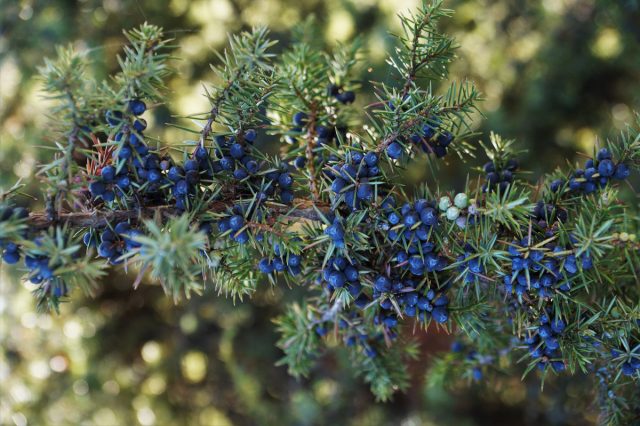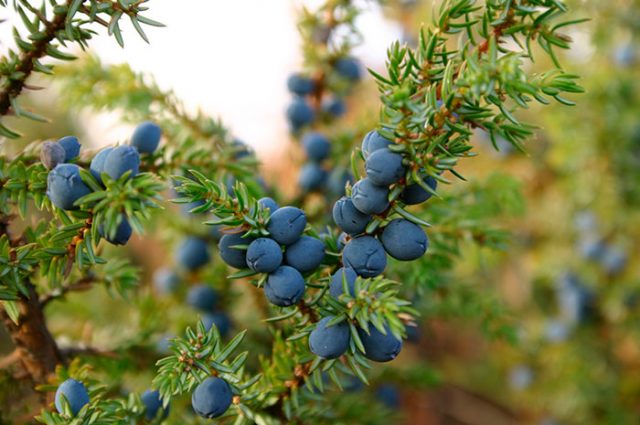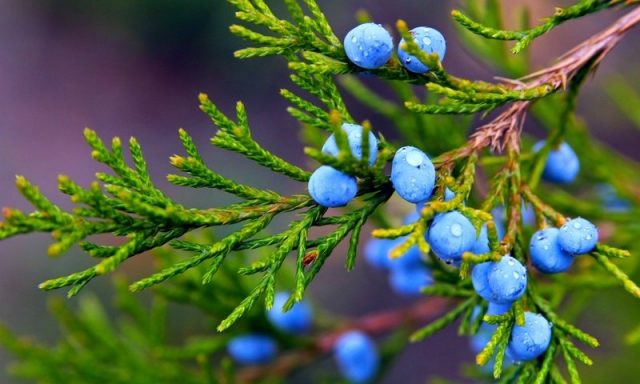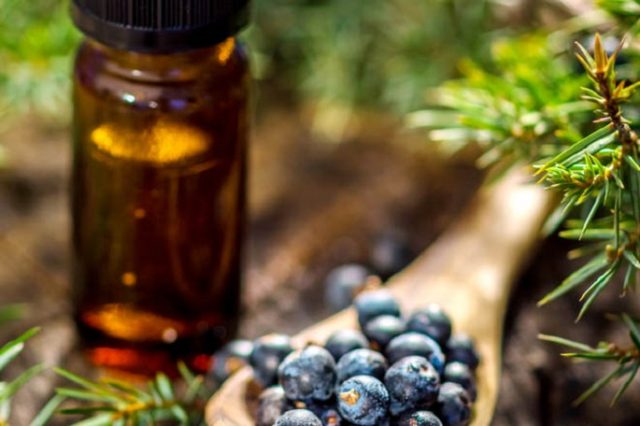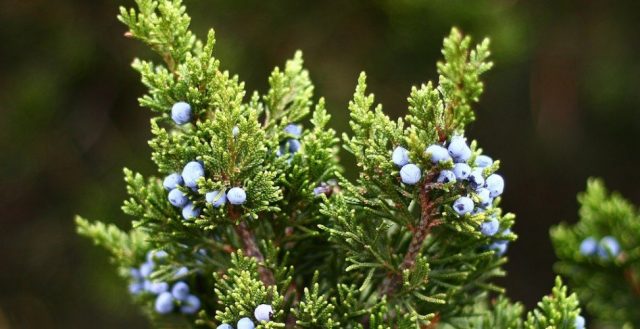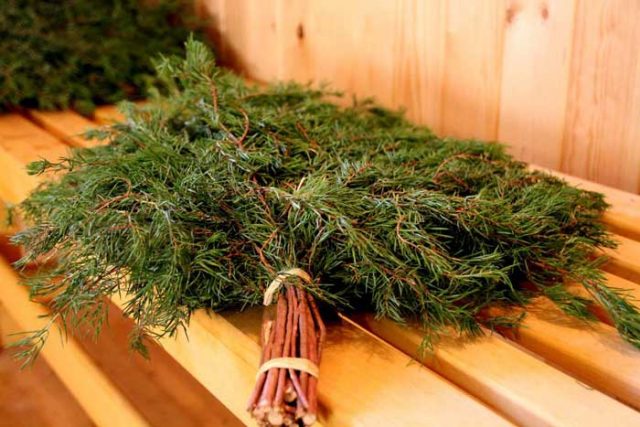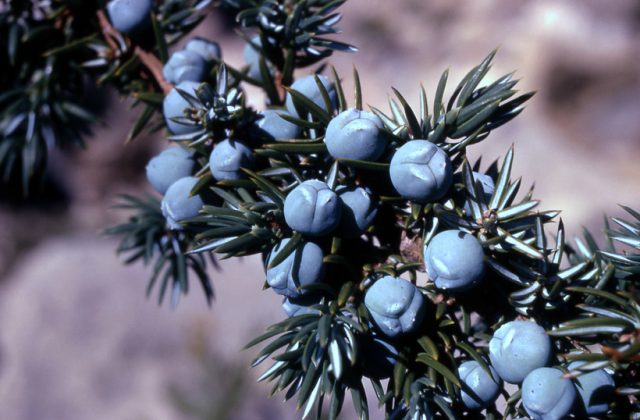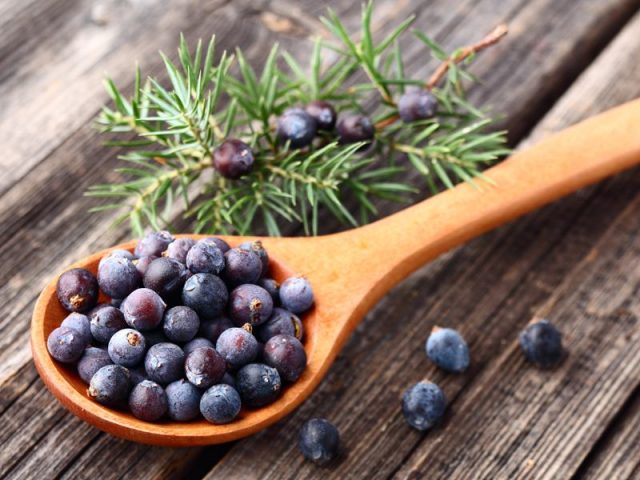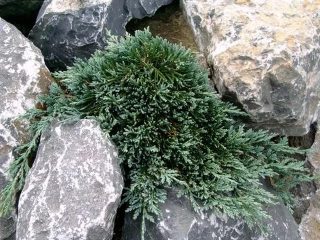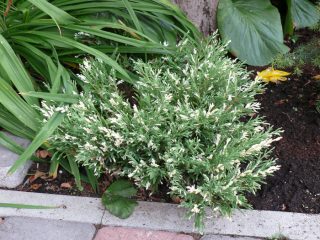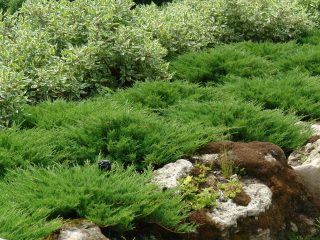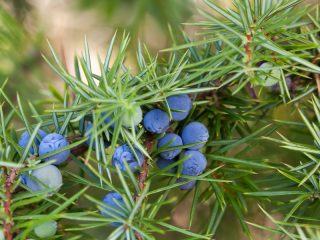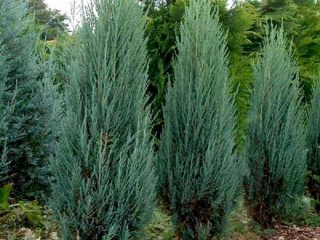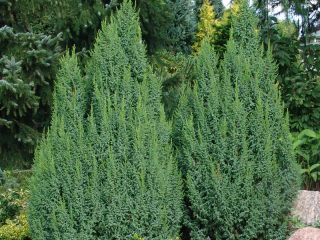Content
- 1 What are the benefits of juniper?
- 2 Health Benefits of Juniper
- 3 What does juniper treat?
- 3.1 Juniper for prostatitis
- 3.2 Juniper for colds
- 3.3 Juniper for cough
- 3.4 Juniper for oncology
- 3.5 Juniper for joints
- 3.6 Juniper in gynecology
- 3.7 Juniper and pressure
- 3.8 Juniper for kidney stones
- 3.9 Juniper for blood purification
- 3.10 Juniper for vessels
- 3.11 Juniper for hemorrhoids
- 3.12 Juniper for diabetes
- 3.13 Juniper for weight loss
- 4 What is juniper used for?
- 5 Harvesting juniper
- 6 Methods of application
- 7 Calorie content of juniper berries per 100 grams
- 8 Contraindications for use
- 9 Conclusion
The medicinal properties of juniper berries and contraindications are an important question for those interested in traditional medicine. Almost mystical medicinal properties are attributed to the berries and other parts of the plant, but in order for juniper not to cause harm, its features need to be studied in more detail.
What are the benefits of juniper?
A coniferous shrub from the Cypress family, growing throughout the Northern Hemisphere, has a lot of medicinal properties and is highly revered in folk medicine. It contains organic acids, pectins and resins, natural sugars, and flavonoid compounds. To prepare medicines, it is customary to use all parts - not only berries, but also wood, pine needles and roots. Each part has its own unique properties that bring a strong healing effect.
What are the benefits of juniper berries?
The fruits are used in the preparation of tonic, anti-cold and choleretic remedies. Among the medicinal properties of berries are:
- antibacterial — juniper effectively fights inflammation and infections;
- tonic — eating berries is useful for loss of strength and depression, with weakened immunity;
- painkillers - the medicinal properties of the plant help with headaches, toothaches, and painful joint inflammations;
- diuretics and laxatives — eating medicinal berries is useful for normalizing digestion and for cleansing the body of excess fluids and toxins.
Juniper berries are actively used in the creation of skin care products; the plant helps fight cellulite and maintain youth longer.
Medicinal properties of juniper bark
The bark of the juniper tree contains not only vitamins and essential oils, but also other components - resins, tannins, saponins. Due to this, wood brings a pronounced beneficial effect in aromatherapy; juniper branches eliminate bacteria in the room and purify the air. Also based on the bark, anti-inflammatory and bactericidal agents are prepared for the treatment of joints and pulmonary ailments.
What are the benefits of juniper cones?
Dried ripe berries, or juniper cones, contain all the vitamins and acids present in fresh fruits in high concentrations. Based on the cones, medicinal products are prepared that have a good effect on colds and chronic pulmonary ailments, kidney diseases and edema.
Medicinal properties of juniper roots
Like the bark, the rhizomes contain increased amounts of tannins and diterpene alcohols. Juniper roots are used in the preparation of bactericidal and anti-inflammatory agents. The medicinal properties of the roots include the fact that medications based on them thin the blood and have a pronounced beneficial effect on blood vessels.
The healing properties of juniper needles
The needles of the medicinal plant contain a huge amount of phytoncides and vitamin C; it also contains esters and tannins. Therefore, juniper needles are used to treat a wide range of diseases.
First of all, pine needle-based products have a beneficial effect on coughs and lung infections. Medicines with the addition of pine needles help with reduced hemoglobin and thyroid gland disorders, heart rhythm disturbances and weakened blood vessels.
What are the benefits of juniper scent?
Even the aroma of the medicinal bush has medicinal properties. When inhaling the scent of juniper, the following effects are observed:
- anxiety and depression go away, mood improves;
- efficiency increases, sleep becomes stronger and more peaceful;
- A cold or chronic cough goes away, nasal congestion disappears.
The aroma of juniper helps relieve migraines; inhaling the aroma is useful for infectious diseases of the respiratory tract.
Benefits of juniper oil
Juniper contains essential oil in large volumes, and it contains phytoncides, terpenes and borneol, camphene and pinene. The oil has a beneficial effect when used in aromatherapy because it purifies and disinfects the air.
For medicinal purposes, juniper oil is used to normalize digestive processes, to relieve coughs and insomnia. The oil helps improve lymph flow and bile outflow, and has pronounced disinfecting properties.
Health Benefits of Juniper
The benefits of juniper for humans are very diverse - berries and other parts of it help to significantly improve well-being. In one form or another, juniper can benefit both adults and children.
What are the benefits of juniper for men?
The beneficial properties of juniper for men consist primarily of tonic properties. Alcohol tinctures based on berries are beneficial for weakening sexual functions, decoctions and teas improve blood circulation and protect the cardiovascular system from failures.
Juniper helps with joint and muscle pain - warming rubbing with essential oil and tinctures on the fruit is recommended.
The benefits of juniper for women
Juniper brings benefits and harm to women's health - decoctions and infusions of the berries help cope with gynecological inflammation and infections. Berries can normalize hormonal levels, so consuming them is useful for painful periods and during menopause.
Berries stimulate the reproductive system, their medicinal properties are beneficial in cases of weakened libido and even infertility. Juniper is used to care for the beauty of skin and hair; it contains many vitamins, organic acids and antioxidants that slow down the aging process.
What are the benefits of juniper for children?
In the absence of allergies, the healing properties of juniper benefit children. Infusions and decoctions prepared from berries strengthen the child’s immunity and help to cope with colds faster. Juniper helps with indigestion in children, normalizes restless sleep and improves brain activity.
However, children can only be offered medicinal products after 5 years of age. In addition, tinctures of berries with alcohol are strictly prohibited for children and adolescents until they reach adulthood.
Juniper during pregnancy
Despite all its medicinal properties, juniper is contraindicated during pregnancy; consuming it internally will cause harm.The fact is that berries provoke excessive contractions of the uterus, and this can lead to a deterioration in a woman’s well-being and even to a miscarriage. Expectant mothers are only allowed to inhale beneficial vapors.
The same applies to lactation - it is better to avoid juniper during breastfeeding. The presence of traces of this plant in breast milk is highly likely to provoke an allergy in the child.
What does juniper treat?
Traditional medicine very actively uses the beneficial properties and contraindications of juniper fruits. Coniferous trees serve as a cure for many diseases and can, if not eliminate them completely, then at least significantly alleviate the symptoms.
Juniper for prostatitis
Anti-inflammatory properties are good for inflammation of the prostate gland in men. This tool is especially beneficial:
- 3 large spoons of juniper berries are mixed with a spoon of fennel fruits;
- add 1 spoon each of dry licorice root, chamomile flowers and parsley root;
- mix the ingredients;
- pour 2 large spoons of medicinal mixture with 500 ml of water;
- boil for 10 minutes.
You need to take the healing mixture twice a day - only 3 sips. The medicinal properties will bring the greatest benefit if you drink the product on a full stomach.
Juniper for colds
Treatment with juniper is beneficial for acute respiratory viral infections, influenza, bronchitis and other colds. Dried berries in the amount of 2 large spoons should be poured with boiling water, and then boiled for another 10 minutes.
When the decoction is properly infused and cooled, you can drink 2 small spoons three times a day.
Juniper for cough
When coughing, inhalation of juniper steam brings the greatest benefit.About 15 dried fruits need to be poured with a liter of boiling water, and then left for 10 minutes under a closed lid. Then you need to bend over the container, covering your head with a towel, and inhale the fragrant steam for several minutes. The healing vapors of the plant will penetrate the respiratory tract, bronchi and lungs and help quickly eliminate the inflammatory process.
Juniper for oncology
The medicinal properties of juniper are so great that they are even used for the treatment of cancer. In particular, for leukemia, it is recommended to take a healing mixture that contains juniper. To prepare it you need to mix:
- juniper cones or wood;
- flax seeds and pine buds;
- linden flowers and nettle roots;
- oak acorns and common blackhead;
- mountain arnica and white mulberry leaves.
All of the listed ingredients are taken in equal quantities, mixed, then 2 large spoons of the mixture are measured and boiled in 500 ml of water for about 10 minutes. The finished product should be drunk three times a day, 3 sips on an empty stomach and a couple more sips immediately after meals.
Juniper for joints
For joint diseases, the medicinal properties of juniper are used mainly externally. You can prepare a tincture with strong alcohol - add 20 berries to 100 ml of alcohol and keep in a dark place for 10 days.
The finished tincture is filtered by squeezing the berries, and then the product is thoroughly rubbed on the sore joints or a warming compress is applied for a couple of hours.
Juniper in gynecology
Juniper as a medicine is beneficial for gynecological infections, colpitis and thrush. The medicinal properties of the berries help cope with bacteria and fungus, eliminate pain and burning.
The greatest benefit will come from douching with a medicinal decoction. About 20 g of juniper berries should be poured into a liter of water, boiled for no more than 5 minutes, then cooled and filtered. Irrigate the genitals twice a day with a slightly warm solution.
Juniper and pressure
A decoction of juniper orally reduces blood pressure. To prepare the remedy you need:
- mix 10 g of berries with oat grains and wheatgrass root, taken in a volume of 5 g;
- pour the collection with a liter of water and boil over low heat until a third of the liquid has boiled away;
- cool and filter the finished broth.
You need to drink the product three times a day, several sips. When taken as a course for 2 weeks, the berries will be able to stabilize blood pressure.
Juniper for kidney stones
An infusion of juniper fruits has diuretic properties and is beneficial for kidney stones. The remedy is prepared as follows:
- pour a large spoonful of berries into a glass of hot water;
- keep the product for 4 hours under the lid;
- strain the infusion.
You need to take the product three times a day, a single serving is only a third of a glass.
Juniper for blood purification
The beneficial properties of juniper berries help cleanse the blood, fill it with valuable substances and qualitatively improve its composition. Cleaning the circulatory system is very simple - chew fresh berries every morning.
You need to start the course of treatment with only 5 berries per day and add 1 piece daily until the total daily dosage is 15 berries.After this, you need to reduce 1 berry every day until only 5 fruits remain for the day.
Juniper for vessels
Vitamins, essential oils and organic acids in berries strengthen vascular walls, lower bad cholesterol and help improve brain function. The healing properties of juniper baths best cleanse and strengthen blood vessels.
A small spoon of berries must be mixed with 2 large spoons of dried lavender, mint and oregano. The collection is wrapped in a clean linen bag and placed in a filled hot bath, after which it lies in it for about 15 minutes.
Juniper for hemorrhoids
Juniper berries are used in folk medicine to treat hemorrhoids, both external and internal. The healing properties of the plant help quickly eliminate hemorrhoids, and juniper can be used in two ways at once.
- Taking juniper oil. If you mix 1 drop of the plant’s essential oil in a small spoon of honey and take the medicine twice a day on an empty stomach, you can eliminate the problem of constipation, which leads to hemorrhoids, and strengthen the walls of the pelvic vessels.
- Therapeutic enemas. Just 3 drops of essential oil need to be dissolved in 5 ml of chamomile decoction and briefly introduced into the anus. You need to repeat the procedure once a day for a week.
You can use juniper oil internally and externally separately, or you can combine treatment methods, then they will bring the fastest effect.
Juniper for diabetes
The medicinal properties of juniper berries and other ingredients help in the treatment of diabetes. To prepare the medicine you need:
- mix 10 g of juniper berries with dandelion roots and flax seeds, take 20 g each;
- add 30 g of burdock root, the same amount of nettle leaves and 25 g of dried blueberries;
- pour 5 large spoons of the mixture with a liter of water and leave for a couple of hours.
Then the infusion will need to be boiled over heat for another 10 minutes and filtered. You need to drink the product three times a day in the amount of a glass. Juniper in combination with medicinal herbs will lower glucose levels and improve the functioning of the liver and pancreas.
Juniper for weight loss
Healing remedies based on the plant help to get rid of excess weight; the instructions for using juniper fruits allow you to treat even obesity with its help.
To obtain a healthy dietary drink, you need to mix the berries of the plant with buckthorn, lovage roots and yarrow in equal volumes. 20 g are separated from the collection and the ingredients are poured with a liter of hot water, and then left for 2 hours.
You need to drink the remedy four times a day, 3 sips. Juniper improves the functioning of the digestive system and promotes faster elimination of toxins. In addition, consuming the plant normalizes hormonal levels, which are also responsible for body weight. All of the listed benefits of the plant make it a good way to quickly lose weight.
What is juniper used for?
Indications for the use of juniper fruits apply not only to home medicine. The properties of the plant can be considered completely universal; juniper is beneficial in cosmetology and hygiene procedures.
Juniper in cosmetology
The medicinal properties of the plant are very popular in home cosmetology, as they are excellent for caring for the skin of the face and body.The essential oil of the plant is especially often used; it is beneficial for the epidermis of any type and has a pronounced rejuvenating effect.
Juniper oil cleanses oily skin and reduces pores, treats acne, softens overly dry epidermis and soothes skin irritations. Therefore, you can add it to almost any masks and scrubs for facial skin. You can also find juniper in cosmetic lotions, creams and masks in stores - many manufacturers include a natural component in their products.
In addition, essential oil is used in the perfume industry. It not only enriches odors, but also serves as a fixative, that is, it is responsible for the durability of the aroma.
Juniper for hair
The essential oil of the plant is also used mainly for hair care - juniper makes hair softer and stimulates its growth. In addition, masks with the addition of healthy oil help eliminate dandruff; the properties of the plant normalize the oily skin on the head and free the pores from toxins.
Medicinal plant oil can be mixed in a volume of 1-2 drops with any base oils and applied to curls as part of masks. Juniper can also be added to regular shampoo, about 5 drops of oil per handful of hygiene product.
Juniper bath broom
Fans of healing steam highly value the properties of juniper wood and its needles and make fragrant brooms from the branches of the plant. Before visiting the steam room, you just need to soak fresh branches in boiling water for a quarter of an hour, and then thoroughly lash your skin with them.
Brooms have a complex therapeutic effect, they improve blood flow and make the skin more elastic.And since the brooms in the steam room emit a rich pine aroma, the procedure also turns out to be useful for the respiratory system - a bathhouse with juniper branches perfectly helps with old coughs and colds.
Juniper pillow
Since the properties of the plant have a pronounced positive effect on nervous disorders, juniper pillows are very popular. They are ordinary sleeping pillows, densely stuffed not with feathers or padding polyester, but with juniper wood shavings.
During use, such a pillow continuously releases phytoncides and aromatic vapors of essential oil. A pleasant light smell not only helps you calm down and fall asleep faster, but also has a healing effect for colds - it eliminates bacteria and strengthens the immune system.
Juniper beads
Aromatherapy with juniper is carried out in a variety of ways. Not only aroma lamps and pillows stuffed with wood shavings are used, but also beads made from juniper wood - beautiful, fragrant and very useful.
The subtle pine scent that such beads emit does not irritate the sense of smell, but has a healing effect - it strengthens the body’s defense system, calms the nerves, and helps with insomnia and migraines. The big advantage of beads is that you can carry them with you everywhere - they are an accessory that suits almost any outfit.
Harvesting juniper
The essential oil of the plant is sold in pharmacies, but other parts should be prepared independently. To do this, you need to know the basic rules for collecting.
When to pick juniper berries and other parts of the plant
It is customary to collect the berries of the plant in September; at this time they fully ripen and acquire a rich blue-black color and pronounced medicinal properties. You can continue collecting until the end of October.
It is best to harvest the bark for medicinal purposes in early spring; at the beginning of the growing season it contains especially many valuable substances. Needles can be collected from autumn to spring, and as for the roots, they are cut off both in spring and autumn.
Rules for collecting raw materials
The first thing to remember before harvesting juniper is that only the ordinary subspecies of the plant is suitable for medicinal use. Cossack juniper is poisonous and does not have any beneficial properties.
The berry picking process is as follows: a piece of cloth or a large sheet of thick paper is spread under the selected plant, and then the branches of the bush are shaken properly. Ripe berries fall down on their own, this additionally helps to separate ripened fruits from unripe ones.
Then all that remains is to clean the berries from pine needles, dirt and dust and lay them out to dry. Juniper is dried in the standard way - in the shade and in conditions of good ventilation.
How to store juniper
It is recommended to keep dried berries, roots, bark and needles at room temperature in a dark place. It is best to store raw materials in dry glass jars or linen bags.Juniper retains its medicinal properties for up to 3 years, after which a new collection must be carried out, since the essential oils and vitamins in the stale plant are destroyed.
Methods of application
There are several main ways to use the twigs and fruits of the plant. Not only medicinal drinks are prepared from it, but also sweet treats, both of which provide health benefits.
Infusion of juniper berries
Juniper berries are used in the preparation of medicinal infusions. Pour a couple of small spoons of fresh berries into a glass of hot water and leave covered for 2 hours, and then strain.
Tea made from juniper branches
If the medicinal properties of infusions based on the plant are used for medicinal purposes, then tea with aromatic branches can be consumed at will, for your own pleasure. To prepare the drink, you need to finely chop clean pine needles and plant branches in the amount of 3 large spoons, and then brew with boiling water in a ceramic teapot.
The drink needs to steep for about half an hour, then it can be poured into cups and, if desired, flavored with honey or lemon juice. The benefits and harms of juniper tea are that the medicinal properties of the drink calm the nerves and improve mood, but, of course, it should be consumed in moderation.
Juniper decoction
Another effective remedy with medicinal properties is a simple decoction of the fruits of the plant. To prepare it, pour 5 g of berries into a glass of just boiled water, place in a water bath and cook for about a quarter of an hour.
Then the container with the broth is wrapped in a thick towel and left until the drink has cooled completely.
Juniper jam
Dried juniper berries are used to make jam - the delicacy is not only tasty, but also very healthy. True, in large quantities the medicinal properties of juniper can harm the body. Therefore, usually a small amount of fruit is added to other ingredients, for example, citrus fruits, and the finished jam is multi-component.
Use of juniper cones
In fact, juniper cones are the dry berries of this plant - it’s not for nothing that they are called cone berries. The main area of application of cones remains medicinal drinks and jams, but they can also be found:
- as part of spicy mixtures;
- in sauces;
- in candies;
- in gingerbread.
Juniper cones are used in the process of smoking meat and fish, when processing fatty meats. The plant improves the aroma and taste of some vegetables, such as beets or savoy cabbage.
Calorie content of juniper berries per 100 grams
The berries of the plant have average nutritional value. 100 g of fresh fruit contains only 116 kcal. At the same time, the nutrients are represented exclusively by carbohydrates - there are no fats or proteins in the product.
Contraindications for use
In some cases, the medicinal properties of juniper can cause harm. Contraindications to the use of the plant are:
- severe hypertension;
- pregnancy and lactation;
- plant allergy;
- renal failure;
- chronic gastritis and ulcers in the acute stage;
- pancreatitis.
You can use the medicinal properties of the plant for no longer than 2 months in a row, then you need to take a break.
The benefits or harms of juniper in the countryside remain controversial.Planting coniferous bushes on the site undoubtedly beautifies the landscape and also eliminates problems with collecting medicinal raw materials. But at the same time, the plant does not coexist well with fruit trees, since it is a carrier of a disease dangerous to them - rust.
Conclusion
The medicinal properties of juniper berries and contraindications are adjacent to each other. Not everyone can use products based on the plant, but if there are no prohibitions on the use of juniper, its properties will bring enormous health benefits.
